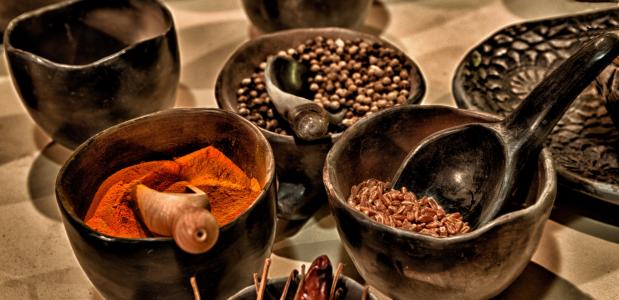
Ayurveda: Natural Herbs and Spices to Balance your Dosha
20 februari 2019 - Koh Samui Holistic Resort
Crowned as one of the world’s oldest holistic medicines of all time, Ayurveda originated in India and has its roots in the B.C. era. Ayurvedic medicine is based on the premise that wellness and health depend on a delicate balance between a person’s physical constitution, mental and emotional nature, and spiritual outlook. It is a combination of six Indian philosophical systems, behavioural and physical sciences, and medical arts.
At a deep level, our beings strive for balance, as it is only in a state of heightened health that our bodies and minds can truly function at their best: to be healthy, there must be harmony between our purpose for healing, our thoughts, feelings, and our physical actions. Ayurvedic medicine seeks to inhibit sicknesses caused by stressors such as inherited defects, injuries, climate or seasonal fluctuations, time management, and unregulated emotions.
History of Ayurveda
Ayurveda is recorded in the Veda, the world’s oldest existing literature, the Veda. By 400 AD, the Ayurveda system of healing had come to deeply influence other health care practices, such as Chinese medicine as well as Buddhist philosophy. Currently, Ayurveda has spread throughout the East and West, and practitioners are increasingly spreading the knowledge and healing techniques of this ancient science.
How is Ayurveda Different from Modern Medicine?
In Ayurveda, every person’s body is considered unique, and therefore there is no one recipe that suits all. It is crucial to discern the individual characteristics of each person in order to recommend suitable medicine. Ayurveda’s main function is as a medicine of prevention and maintenance, although it can also be used to fight disease. When receiving an Ayurvedic consultation, patients receive suggestions for food and lifestyle changes, more than a prescription for pills.
The Three Doshas and How They Affect your Health
According to Ayurveda, doshas are the universal life forces that manifest as three different energies. The three doshas are vata, pitta, and kapha. They are biological forces found in the human mind and body, and although each individual has all of these, there is usually a predominance of just one or two. The unique combination each person possesses is called the prakruti, which is the personal blueprint or nature that we are born with. As individuals go through life, the proportion of their doshas can fluctuate, depending on circumstances like our environment, eating habits, the seasons, our age, and many other factors. Maintaining balance of our doshas implies keeping a healthy balance in our health, energy level, and mood.
- Vata is the energy of breathing, circulation, elimination, movement, speech, enthusiasm, creativity, and the nervous system. A vata constitution has a tendency towards arthritis, constipation and anxiety. Vata people are commonly thin, and they like to move around and enjoy creative activities. When imbalanced, they can be ungrounded and anxious. Balance vata with warming spices like cinnamon, cloves and cardamom (try ‘golden milk’), and ginger, garlic and black pepper.
- Pitta rules transformations, such as metabolism and digestion, as well as body temperature, vision, complexion, courage, cheerfulness, intellect, and judgement. The pitta type has a predisposition towards infections, inflammations, and ulcers. Pittas are fiery, intense, irritable and strong. Balance pitta with cooling herbs like basil, peppermint and tarragon, vanilla, and turmeric, and by avoiding garlic.
- Kapha governs growth, lubrication and fluid secretions, potency, patience, heaviness, compassion, and understanding. Kaphas can easily become overweight, and have diabetes or congestive disorders. Kapha individuals are ruled by the earth and water elements, and they have wide frames as well as stable natures. When imbalanced, they are unmotivated and stubborn. Balance kapha with oregano, rosemary, and thyme, and ginger and garlic, and by avoiding salt.
Imbalance occurs when any of these energies increases in quantity, or changes in terms of its quality. Usually this happens when individuals are not able to perceive things as they are, when we mistreat our bodies, or even when we do the right things at the wrong times.
Ayurveda and Cancer
In Ayurveda, cancers are treated as more than just a physical condition, by regarding mental, emotional, physical, and spiritual states all together. Cancerous cells are defined as ‘bad’ cells, however, Ayurveda’s view is that they have become so disconnected from their roots in consciousness, that they’ve lost memory of how to function correctly. This is caused by unhealthy lifestyles, toxins, stress and fear, pollution, and so forth.
There are a number of herbs and spices that can be used to treat cancer; and in this article we focus on those used to treat colon cancer. The assistance of a qualified practitioner is highly recommended as treatment are as personal as each individual’s doshas.
Herbs and plants for treating colon cancer
Ashwagandha: This herb helps in a large number of ailments, increases our resistance to stress while also inhibiting the growth of tumours cells.
Garlic: This plant bulb reduces brain and colon cancer cells. Combined with broccoli, it is an effective anti-cancer agent.
Green tea: Tea can inhibit the formation of cancer cells, and its catechin polyphenols can reduce cancerous cells during their early stages.
Celandine: This is a member of the poppy family, and apart from being know for treating colon cancer, it boosts the immune system.
Aloe vera: Cleans the digestive tract and removes harmful toxins.
Apple cider vinegar: Acts as an anti-inflammatory and has been shown to be effective in treating colon cancer.
Ginger: This is an Ayurvedic staple, it soothes and heals the digestive tract.
Turmeric: Claims are that the compounds in turmeric can heal just about anything. This roots causes colon cancer cells to self-destruct.
The Ayurvedic tradition highly recommends including these herbs, spices and such into your routine, for both prevention and healing. Healthy diets complemented by these herbs and spices have a great potential to bring about positive results.
-





